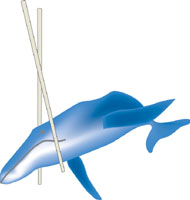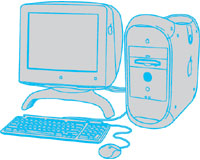The Pulse
Back to Contents of Issue: August 2003
|
|
|
|
|
|
|
Raising the Bar
Radical reforms to the country's creaking legal system have centered on a single goal: to triple the number of lawyers in Japan by the end of the decade. That increase would see the ranks of lawyers boosted from their current level of just over 18,000 to around the same number of individuals employed in the nation's mining industry.
The reforms have sparked instant outrage from the elitist chambers of Japan's existing lawyers, who contend that the only way to engineer that increase is to lower standards. The government counters this with the assertion that the new course will place a higher emphasis on practical experience than book learning.
Since 1991, the amount of litigation has doubled, Unlike the US and Europe, Japan has historically made do with a very small base of qualified lawyers. Until the 1990s it was able to do this because the population was relatively non-litigious, and the volume of corporate work was also low.
But since 1991, the amount of litigation has doubled, and "big bang" reforms at the end of the decade created a surge in the need for lawyers handling merger and acquisition work. Worried by clear evidence that the yawning gap will readily be filled by foreign professionals, the Japanese government has set about forming grand plans to turn Japan into a nation of lawyers overnight.
The government's efforts, framed by the Judical Reform Council (JRC), come in the form of a two-pronged attack. The first is to change the notoriously difficult legal qualification process and make it easier for young people to enter the profession. The second is a broader attempt to make being a lawyer a more attractive career prospect than it is at the moment.
The latter issue is a huge problem that could take years to change, say members of the JRC. Thirty thousand Japanese graduate with law degrees every year, but only 200 go on to become qualified lawyers. The bureaucracy and big business have always started their recruiting with law graduates, and they have always offered enough cash or status to tempt people away.
"Just before graduation companies like Sony and Toshiba started recruiting me," says Yuji Hisoo, a law graduate from Waseda University. "The law firms had names I had never heard of, and you had to train for years. It was not a real choice."
But the first assault began to take shape earlier this summer. Universities across Japan were given a short window in which to apply to set up law schools that could convert graduates from any academic discipline into prosecutors, solicitors and even judges. Seventy-two institutions -- nearly half from Tokyo -- met the deadline and, says one university source, "have been given the nudge that every single one will have their application accepted."
The law schools, armed with 550 academic staff, are all expected to throw open their doors for business in April 2004, which is the beginning of the Japanese academic year, and it is hoped that between them they will churn out around 6,000 converts per annum. They will then sit for a new version of the bar exam, which has also been reformed in an effort to swell the ranks of the lawyer army.
Battles have already broken out over the setting of the fees for these schools, which are expected to charge around JPY1.5 million per year. Another early squabble centers on which is the most appropriate entrance test for the schools. Forty-four say that they will use an exam administered by the National Center for University Entrance Exams. Twenty-seven have said they will opt for one set by the Japan Law Foundation.
Either way, the presence of the law schools and an accelerated qualification process throws a major wrench into a system that has remained unchanged for 60 years. Since the war, the pattern has been that almost only graduates with a full law degree are accepted to move on to the bar exam. This is then followed by a mandatory period at the state Training Institute, creating an average time from school to qualification of about 10 years.
"We think it is a very good thing that the shortage of lawyers is finally being addressed. We have to admit that that we need more," says a spokesperson for Nagashima Ohno & Tsunematsu, Japan's biggest law firm. "Our only concern is that these new law schools come with a guarantee of the quality of education."
-- Leo Lewis
Beached Whale Banquet
Fuel Cells for the Masses
It's much more likely that the next PC or motorcycle you buy will be powered by fuel cells. Japanese manufacturers are falling over each other in a mad race to be the first to offer a fuel cell-powered product. NEC, Toshiba, Casio and Hitachi are all working on fuel-cell PCs or accessories and will likely have them for sale in 2004. Yamaha Motor also announced recently that it is near completion of a motorbike powered by a fuel-cell stack; the bike will be able to scoot around town like a 50cc bike on just methanol and water. The company says it hopes to be selling the bike soon.
The next PC or motorcycle Mitsubishi Heavy Industries has even come up with a fuel-cell unit that would supply homes with cheaper hot water and electricity. It's planning to have the product completed in two years. And to be fair to the carmakers, some of them have already released prototype cars that run on fuel cells. Most of these prototypes have been leased to government agencies here and in the US for the time being.
Fuel cells create electricity by making a chemical reaction with hydrogen and oxygen. The cells emit water vapor, not carbon dioxide, and that's the big reason they're seen as the technology of the future. But don't expect the first line of fuel-cell products to be flawless. The overwhelming feeling among Japanese manufacturers is that they should get their products out fast, establish their reputation as fuel-cell pioneers and work out the kinks later.
NTT Targets China
Systems integration is all the rage in Asia, and NTT appears to be leaping on the bandwagon uncharacteristically early. As we reported in our June 2003 feature, Internet protocol version 6 (IPv6) promises a plethora of new online addresses for formerly "homeless" non-English speakers, and Asia is leading the way in its development.
In addition to revolutionizing Web sites, IPv6 will connect your home appliances (from toasters to air conditioners) to the Net.
Whatever the fate of IPv6, we fervently hope NTT overseas is leaner and meaner than it is at home. |
|
Note: The function "email this page" is currently not supported for this page.


 JAPAN, THE ONLY DEVELOPED country fortunate enough to have a serious shortage of lawyers, has finally accepted defeat and launched a massive drive to recruit a fresh "army of solicitors."
JAPAN, THE ONLY DEVELOPED country fortunate enough to have a serious shortage of lawyers, has finally accepted defeat and launched a massive drive to recruit a fresh "army of solicitors."
 After Japan threatened to withdraw from the June International Whaling Commission meeting in Berlin over its whaling conservation platform, a Fisheries Ministry panel announced a solution to the mysterious natural phenomenon of beached whales: Eat them. Currently in Japan, as elsewhere, beached whales that are still alive -- which is often their condition upon discovery -- must be returned to the sea. Deceased beached whales must be buried or incinerated. But the panel's report announces that such solutions are "too costly and dangerous." If whale rescue is deemed too difficult, the panel concludes, the whales should be killed -- and murdered at an early stage, so the meat is still edible. Back in early 2002, in a small Kagoshima town, 13 sperm whales beached and died during a single week. Residents appeared armed with chainsaws in order to carve up the remains. Whale skin fetches over JPY5,000 per kilogram; tail parts fetch JPY10,000 per kilogram, and a whale tail can bring in JPY2 - 3 million. There does appear to be a PR problem here. Simply put, in the face of global criticism fast approaching worldwide rage, Japan seems to be saying: If you can't beat 'em, eat 'em.
After Japan threatened to withdraw from the June International Whaling Commission meeting in Berlin over its whaling conservation platform, a Fisheries Ministry panel announced a solution to the mysterious natural phenomenon of beached whales: Eat them. Currently in Japan, as elsewhere, beached whales that are still alive -- which is often their condition upon discovery -- must be returned to the sea. Deceased beached whales must be buried or incinerated. But the panel's report announces that such solutions are "too costly and dangerous." If whale rescue is deemed too difficult, the panel concludes, the whales should be killed -- and murdered at an early stage, so the meat is still edible. Back in early 2002, in a small Kagoshima town, 13 sperm whales beached and died during a single week. Residents appeared armed with chainsaws in order to carve up the remains. Whale skin fetches over JPY5,000 per kilogram; tail parts fetch JPY10,000 per kilogram, and a whale tail can bring in JPY2 - 3 million. There does appear to be a PR problem here. Simply put, in the face of global criticism fast approaching worldwide rage, Japan seems to be saying: If you can't beat 'em, eat 'em.
 Japan's telecom giant, NTT, is targeting China in its efforts to develop systems integration operations. The monopoly intends to more than double its local revenues in China by 2007, anticipating a rapid expansion in that country's information technologies and communications markets. NTT's new subsidiary in Guangzhou will manufacture Internet-protocol format networks and will also target appliance manufacturers in the region.
Japan's telecom giant, NTT, is targeting China in its efforts to develop systems integration operations. The monopoly intends to more than double its local revenues in China by 2007, anticipating a rapid expansion in that country's information technologies and communications markets. NTT's new subsidiary in Guangzhou will manufacture Internet-protocol format networks and will also target appliance manufacturers in the region.



